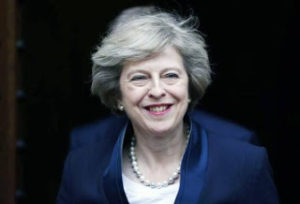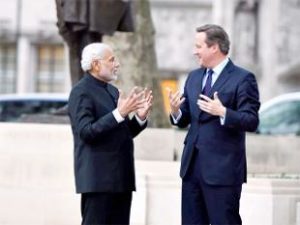 India is considering recalibrating its strategy, including renegotiating its tariff offers, for the proposed free trade agreement (FTA) with the EU following Brexit, with demands from key sectors for a separate trade pact with the UK gathering pace, sources said. But with both the EU and the UK busy grappling with Brexit, serious trade negotiations are unlikely to start anytime soon.
India is considering recalibrating its strategy, including renegotiating its tariff offers, for the proposed free trade agreement (FTA) with the EU following Brexit, with demands from key sectors for a separate trade pact with the UK gathering pace, sources said. But with both the EU and the UK busy grappling with Brexit, serious trade negotiations are unlikely to start anytime soon.
Textiles secretary Rashmi Verma told FE: “Britain continues to be an important market for us, as it makes up for around 23% of the EU demand for Indian textiles and garments. We have requested the commerce ministry to look into the possibility of a bilateral preferential trade agreement (PTA) with the UK.”
The UK accounts for over a half of India’s software services exports to the EU, 23% of key engineering and electrical goods exports and 16% of jewellery, precious metal and stones exports. So, senior industry executives from these sectors endorse an FTA or PTA with the UK. Britain alone accounted for 3.4% of India’s goods exports in 2015-16, while the EU – including the UK – made up for 17%.
Nasscom president R Chandrashekhar said once the current storm settles down, the UK will also be looking to compensate itself for no longer being part of the EU trade bloc.
“At that time, a special trade arrangement or relation with India will become crucial to them. And for India, it will perhaps be a tad easier to negotiate with one nation instead of the entire EU,” he said. He, however, added that much will depend on the exact terms and conditions of Britain’s exit from the EU.
Meanwhile, sources said the government is open to a trade pact with the UK, but India also remains committed to taking the proposed EU FTA talks to its logical end. “The EU isn’t ignorable just because Britain has decided to be out of the bloc,” said one of the sources.
However, the Brexit has added to the workload of Indian negotiators as they have to deal with the UK separately now. As such, the FTA with the EU is still a work in progress, so there is a scope for renegotiation of offers in view of the Brexit reality, said the source. The government is closely monitoring the situation and a final call will be taken at an appropriate time, the source added.
With the depreciation of the pound, euro and Chinese yuan following the Brexit referendum, India’s export competitiveness to these regions has come under strain. If the situation persists, a trade pact with the UK or the EU will come handy, as fears of China pegging its currency to its advantage loom, said analysts. The pound, euro and the Chinese yuan have depreciated almost 12%, 2.3% and 1%, respectively, against the dollar while the rupee has appreciated 0.1% between the closing of June 23 and July 1.
But a foreign diplomat posted in New Delhi said: ”Their (the EU’s) job is already cut out. They have to first finalise the terms of the British exit, which is a mammoth and complex task. Both the parties have to recalibrate their strategy even at the WTO. In such a situation, starting another front of negotiations (with India) could take some time,” he said.
As such, differences already persist on the broad contours of the proposed FTA, including on EU’s insistence that India cut import duties on auto parts and wine and strengthen intellectual property rights regime and Indian demand for greater liberalisation in services.
Anwarul Hoda, a former deputy director general at the WTO and current chair professor for trade policy at Icrier, said the Brexit holds some potentially good news for India, apart from the obvious shocks. “The UK is more liberal than the rest of the EU. So, it could still be easier for India to clinch an FT A with the UK than with the EU.”
A with the UK than with the EU.”
There is a fair amount of chance that an FTA with the UK, if talks are initiated simultaneously, will be sealed before such a deal with the EU, he said. In fact, Britain doesn’t have the same baggage as the EU. For instance, the UK may not stubbornly insist on the removal of tariff barriers in automobiles as the EU, as the former isn’t a major auto player.
The EU hasn’t yet given the dates for a resumption of the FTA talks, said the source mentioned earlier. Recently, commerce minister Nirmala Sitharaman had written to her EU counterpart, asking for dates to resume the negotiations.
Source: http://www.financialexpress.com/article/economy/after-brexit-vote-india-to-tweak-eu-fta-strategy/309181/






 A with the UK than with the EU.”
A with the UK than with the EU.”